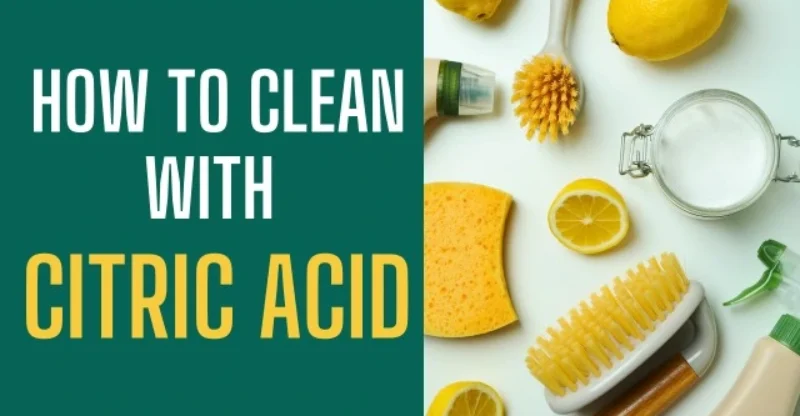10 Things To Clean With Citric Acid
Have you ever used lemons to clean your home? Did you know that the secret behind their cleaning power lies in a compound called citric acid?
Instead of always relying on lemons, you can opt for a bag of food-grade powdered citric acid. This simple product is fantastic for descaling, disinfecting, and getting rid of mold or mildew.
Let’s explore how to use citric acid and what you can clean with it.
What is Citric Acid & How to Use It for Cleaning?
Citric acid is a natural substance derived from citrus fruits. It is an environmentally friendly cleaning agent that can effectively tackle various household cleaning tasks.
Its acidic properties make it ideal for breaking down and dissolving stains without causing damage, making it a great alternative to harsh chemicals.
Citric acid has become a popular choice due to its non-toxic properties and effectiveness in removing tough stains and mineral deposits.
Let’s explore ten practical ways you can clean with citric acid around your home.
1. Tea Kettles and Coffee Machines
Mineral deposits can build up inside tea kettles and coffee machines over time, affecting the taste of your beverages.
To descale and clean these appliances, fill them with a mixture of citric acid and water (1 tablespoon of citric acid per cup of water), bring it to a boil, and let it sit for an hour. Rinse thoroughly afterward.
2. Clean Kitchen Countertop Surfaces
Citric acid can effectively remove stains and sanitize surfaces for stainless steel or laminate countertops. Make a paste of citric acid powdered and water, spread it to the stains, let it soak for a few minutes, and then wipe away with a moist towel.
3. Remove Soap Scum
To effectively remove soap scum, create a simple citric acid solution. Mix one part citric acid with three parts warm water in a spray bottle. Shake the bottle well to ensure the citric acid is fully dissolved.
- Spray the citric acid solution directly onto the soap scum.
- Allow the solution to sit for a few minutes to break down the soap residue.
- Using a scrub brush or sponge, gently scrub the area to loosen the soap scum.
- Rinse the surface thoroughly with water.
- For rigid or stubborn soap scum, repeat the process if necessary.
4. Remove Stains from Natural Stone
Citric acid is gentle enough to clean natural stone surfaces without causing damage. To effectively remove stains from your natural stone using citric acid, follow these simple steps:
Create a citric acid cleaning solution by mixing one part citric acid powder with three parts warm water. Stir well until the powder is completely dissolved.
Soak a clean cloth or sponge in the solution and gently scrub the stained area. Pay extra attention to any deep-set stains.
Let the solution sit on the stain for a few minutes to allow the citric acid to penetrate and break down the stain.
Rinse the area thoroughly with clean water to remove any residue.
Wipe the surface dry with a soft cloth to prevent water spots.
5. Dishwasher and Kitchen Sink
To deep clean your dishwasher, run an empty cycle with citric acid powder in the detergent compartment. That helps remove buildup and odors.
For the kitchen sink, sprinkle citric acid around the drain, let it sit, then flush with hot water to clear clogs and remove residue.
6. Clean Windows and Mirrors
Add a tablespoon of citric acid to warm water in a spray bottle to create a streak-free window and mirror cleaner.
Spray the solution onto the glass surface and wipe with a clean cloth for a sparkling finish.
7. Showers and Bathtubs
Aside from removing soap scum, citric acid can also eliminate mold and mildew in showers and bathtubs. Apply a citric acid solution to affected areas, let it sit for some time, then scrub with a brush.
Rinse thoroughly to reveal a clean and sanitized surface.
8. Remove Toilet Bowl Stains
Pour a cup of citric acid powder into the toilet bowl, scrub it with a toilet brush, and let it sit for an hour before flushing.
Citric acid effectively breaks down hard water stains and mineral deposits, leaving your toilet bowl looking pristine.
9. Dehumidifiers
Regularly cleaning your dehumidifier is crucial to maintain its efficiency. Follow manufacturer guidelines for safety.
Prepare a citric acid solution by diluting citric acid powder in water. Use a brush or sponge to scrub away mineral deposits and mold from the disassembled parts. For stubborn stains, soak the affected components in the citric acid solution to make scrubbing easier.
Once you’ve cleaned all parts thoroughly, rinse them with clean water to remove any remaining citric acid solution. Allow the components to air-dry completely before reassembling the dehumidifier and using it again.
10. Cleaning Water Bottles
Dissolve the citric acid in warm water according to the recommended ratio on the packaging. Typically, a solution of 2 tablespoons of citric acid per quart of water is adequate.
Submerge your water bottle in the citric acid solution. Let it soak for at least 30 minutes to loosen dirt, stains, and mineral deposits.
For stubborn stains or residue, use a cleaning brush or bottle brush to scrub the interior of the bottle. It helps dislodge any remaining buildup.
Thoroughly rinse the bottle with clean water to remove any citric acid residue. Ensure all cleaning solution is washed away. Then, air-dry your bottle upside down on a dish rack or towel.
Conclusion
Citric acid is a powerful cleaning agent that can revolutionize your cleaning routine. With its natural properties and versatility, it can tackle tough stains and grime throughout your home, leaving it sparkling clean.
Say goodbye to harsh chemicals and embrace the natural cleaning power of citric acid.
FAQs
Citric acid is safe and non-toxic when used as directed. However, it’s always recommended to follow safety precautions and keep it out of reach of children and pets.
Citric acid is safe for many surfaces, including stainless steel, glass, and natural stone. However, it’s best to test in an inconspicuous area first, especially on delicate surfaces.
When used correctly, citric acid is safe for most appliances. However, to avoid damage, always refer to appliance manuals for specific cleaning instructions.
Recommended For You:
- How To Clean A Garbage Disposal With Baking Soda
- How to Clean a Plastic Cutting Board with Lemon
- 7 Best Types Of Mops For All Your Cleaning Needs
- How To Clean Leather Furniture With Household Products
- 11 Ways To Keep a Clean House With a Busy Schedule
- Deep Cleaning Checklist for House: A Comprehensive Guide



